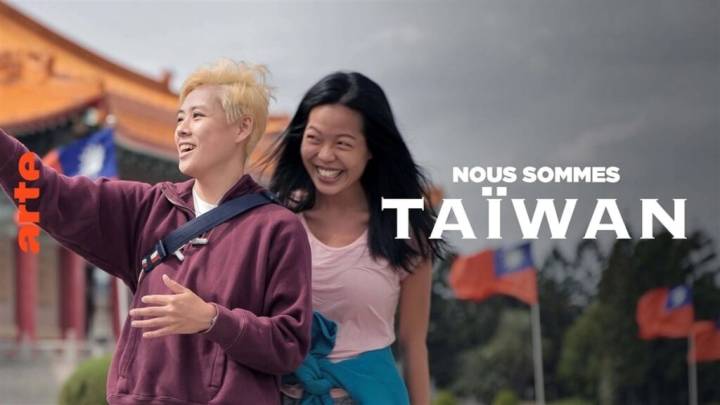
Taipei, March 28 (CNA) What is Taiwan's identity?
For Pierre Haski, president of Reporter Without Borders (RSF), Taiwan's identity has coalesced around the idea of democracy, which led him to make a documentary chronicling how its national identity was formed and how it changed over the years.
In the 53-minute "Nous sommes Taïwan" ("We are Taiwan"), the 69-year-old French journalist explored the evolution of Taiwan's democracy and illustrated his belief that "Taiwan identity" has become a powerful narrative that has given it a voice in the world.
Haski said he has visited Taiwan at regular intervals for more than 20 years, starting in 1999 to report on Taiwan's presidential election held in early 2000.
What surprised him the most on his most recent visit was the rather large consensus on the idea of people in Taiwan identifying themselves as Taiwanese.
Haski's documentary highlighted this shift, seen in polls conducted over time of the proportion of people identifying themselves as "Chinese," "Chinese and Taiwanese" and "Taiwanese."
While only about 20 percent of local residents considered themselves to be "Taiwanese" shortly after martial law was lifted in 1987, that number has surged to over 64 percent today, while those identifying themselves as Chinese are almost gone, the documentary said.
Haski indicated that the documentary's title was intended to reflect this shift, and that even though the Taiwanese are divided politically and over several other issues, they share the same collective sense of identity.
To shoot the documentary, Haski conduct interviews in Taiwan on the formation and essence of Taiwan identity with people who have a wide range of perspectives.
They included Presidential Office spokesperson Kolas Yotaka, the founder of contract chipmaker United Microelectronics Corp. (UMC) Robert Tsao (曹興誠), Kuomintang international affairs specialist Wu Liang-i (吳亮儀), and Digital Affairs Minister Audrey Tang (唐鳳).
People in Taiwan are not just Chinese people, or people from China, Kolas said as the film started. At the beginning there were Indigenous people, who were followed by the colonial cultures of Spain, the Netherlands, the Qing Dynasty and Japan.
These different cultures "converged to form new identities, cultures, beliefs and customs," she said.
In addition to more traditional and official faces, Haski also talked to pop culture workers with viewpoints more representative of the younger generation, such as Zero Chou (周美玲), who directed "Untold Herstory" (流麻溝十五號), and Ho Shan-jung (何姍蓉), producer of the YouTube channel EYECTV.
In a scene where she holds her friend's hands in the rain to watch a gay parade concert, Chou said: "A cultural atmosphere like this makes me very proud of our country."
A great and mature nation does not need a strongman; it needs a civil society to become truly mature, Chou said.
Haski said Taiwan is facing a major contradiction.
The law and diplomacy are not on Taiwan's side, given that the legal principles and diplomatic frameworks regarding Taiwan were set 50 years ago when Taiwan was under martial law and the people did not have a voice, he said.
That meant that the "one China" concept, in which Taiwan is seen as a part of China, was formed without asking for the opinion of Taiwan's people, the director said.
As Taiwan became democratic in the 21st century, however, people in Taiwan have shown their collective will to defend what they have built and do not want to take paths decided by others, Haski argued.
So while Taiwan is in an unfavorable position in terms of international law, but legitimacy and morality are on Taiwan's side, in areas where Taiwanese can make their voices heard, he said.
Bringing that voice and collective will to a European audience was a key reason for making the documentary, he said.
Though Taiwan is diverse and complex, Europeans generally discuss Taiwan in geopolitical terms, such as China's desire to annex Taiwan and semiconductors, while lacking exposure to other aspects, Haski said.
"We rarely hear the voices of Taiwanese people themselves," Haski said. "Not many people in Europe know that Taiwan's democracy was born out of the people's fight against dictatorship, or about the complexity of the different groups of people who make up Taiwan."
Building Taiwan's identity around democracy, he said, "has allowed Taiwan to construct a society that's relatively harmonious, that shows respect for ethnic, linguistic and gender minorities. That's the exact opposite of what's happening in China."
The documentary can be seen on Arte's website from March 21 to the end of June. It was on Arte's YouTube channel on Sunday, and will be aired on TV on Tuesday.
Since "We are Taiwan" was launched, many people have expressed their appreciation to Haski for the documentary, saying they learned a lot from it.
"There was even a sinologist who texted me and said it was very useful. It was a good comment because it was the goal of the film to be useful in helping people understand the stakes," Haski said.